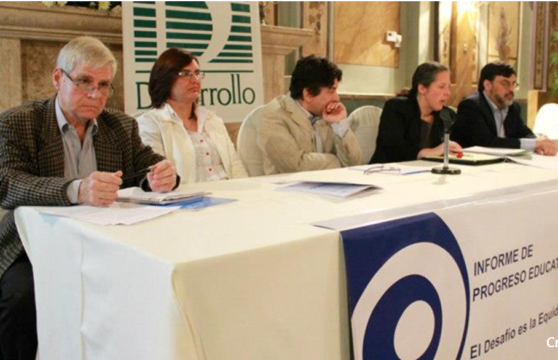
PREAL Launches Education Report Card in Paraguay
Report analyzes nine areas of the education system in Paraguay and unveils a variety challenges and improvements for quality education.
Earlier this month, protests in Asunción gave Paraguay some rare international media attention as opponents of a constitutional amendment to allow presidential reelection stormed and set fire to Congress. One protester was shot and killed by police. This question—whether or not President Horacio Cartes, whose term in office has brought impressive economic growth, should be allowed to run again—has polarized the country, reigniting debates stemming from its long history of military dictatorships. Eventually, Cartes bowed to the pressure and announced he would not run in 2018, effectively ending the amendment effort.
While Cartes’ willingness to step aside may be rare, Paraguay is not alone in grappling with term limits. In recent years, reelection efforts have multiplied across Latin America as leaders have decided that staying in office is the best way to advance their political goals and satisfy their appetite for power. Before the 2000s, many governments (with some exceptions including Brazil, Argentina, and Peru) had strict term limits on consecutive reelection—often a product of the sour taste left by intransigent authoritarians and dictatorships.
But that norm has rapidly eroded. In 2005, President Álvaro Uribe secured the right to a second consecutive term in Colombia (although reelection was revoked by Uribe’s successor, Juan Manuel Santos, in 2015). In 2009, Hugo Chávez eliminated limits entirely in Venezuela. In 2014, Nicaragua’s Congress allowed President Daniel Ortega to run for a fourth term and beyond. In Bolivia, President Evo Morales used a clever judicial maneuver to secure a third term in 2013 and last year barely failed to pass a referendum enabling a fourth term. Many expect him to try again before the 2019 elections. The Supreme Court in Honduras ruled last year that term limits were an undue restriction on the president’s rights—an ironic turn of events, considering how six years earlier, in 2009, President Manuel Zelaya was deposed in a coup for attempting to run for reelection. According to polls the current president, Juan Orlando Hernández, seems likely to win reelection later this year.
Even in countries with limits only on consecutive reelection, former presidents often return to run again once they are able. In Chile, former president Sebastián Piñera is running to replace President Michelle Bachelet, herself a non-consecutive “returner.” Another former president, Ricardo Lagos, recently dropped out of the race after failing to secure his party’s endorsement. In Brazil, Argentina, and Costa Rica, former presidents are rumored candidates in the next presidential elections. Most would presumably run with an implicit promise to bring back the prosperity of their first terms.
Theoretically speaking, there are many strong arguments both for and against term limits. On the one hand, reelection gives voters a chance to reward good governance and punish failures. It encourages policy consistency and follow-through. Often presidents need more time to accomplish their goals—Uribe in Colombia faced the threat of a failed state and a national emergency; his successor, Santos, couldn’t expect to sign a peace accord until his second term; Fernando Henrique Cardoso in Brazil needed more time to enact a reform agenda.
Reelected leaders are perhaps more reliable, often known entities with less unpredictability or chance of mismanagement. Political parties tend to be weak in Latin America, and often dependent on a charismatic leader. Presidents may not want to risk even anointed successors, who can change course and upend a political project, or could simply prove to be less capable. Those successors may also be more likely to lose, potentially even to a destabilizing or unqualified political outsider. And perhaps most fundamentally, voters could very well deserve the right to select whomever they prefer without restriction.
On the other hand, the risks of corruption and abuse of power are likely to grow over time. Staying in office may become simply a tool in the pursuit of power, prestige, and riches. New leaders mean new ideas and fresh thinking (albeit not always for the better). Term limits may help strengthen parties by forcing them to think outside a single candidate. Political competition is an important cornerstone of democracy, and incumbency is a powerful advantage, especially in countries where state resources can be used for political purposes. While governing parties also benefit from holding office—for example, Mexico’s 71-year single-party rule under the PRI—incumbency is doubly advantageous to individual candidates. As Michael Penfold and Javier Corrales found in a 2014 study, “the right to reelection increases the electoral advantage of incumbents to the detriment of accountability.” The track record is striking: only two sitting Latin American presidents have ever lost a reelection bid—Hipólito Mejía in the Dominican Republic in 2004 and Daniel Ortega in Nicaragua in 1990. Ortega returned to the presidency in 2007 and has so far been reelected twice more.
To be sure, these are debates that don’t just apply to the Americas. Countries around the world have grappled with questions of term limits nearly since democratization. The United States didn’t pass the 22nd Amendment limiting a president to two terms until 1951, after Franklin Roosevelt won four consecutive elections. Opinions on reelection vary widely across political systems, democratic traditions, and relative strength of democratic institutions.
Such debates aside however, there’s also a separate question: how well do reelected leaders tend to perform when they are back in office?
In recent years, second (and third) terms in Latin America have generally not met expectations, sometimes disastrously so. Rarely are second terms more successful than the first and the trend has only grown since the end of the commodities boom—which brought remarkable but unsustainable prosperity, and with it dramatically heightened expectations. To be sure, approval ratings are down for leaders across the region, but the pattern is especially pronounced for presidents in office for two or more terms. Leaders who could have walked away from public life with high approval ratings and glowing legacies instead slumped through scandals, weary electorates, and economic blues.
In Brazil, Dilma Rousseff’s reelection in 2014 was almost immediately followed by economic woes so deep that she was impeached in less than two years. Many argue that short-term economic policy choices intended to help Rousseff get reelected made the crisis far worse in the long run. In Colombia, reelection gave Juan Manuel Santos time to seal an accord with the FARC (and secure a Nobel Peace Prize), but he has struggled politically at home in the time since. Argentina’s Cristina Fernández de Kirchner, who left office in 2015 after two terms, has been indicted on corruption charges. In Venezuela, Hugo Chávez’s four consecutive elections were a clear factor in what has become the hemisphere’s worst political and economic crisis. Both Bolivia’s Morales and Ecuador’s Correa have seen their once-soaring approval ratings—high even after their first reelections—slowly decline over the past decade.
Perhaps the most instructive case, though, is Chile’s Bachelet. After a rosy first term from 2006-2010 and three years as a globally respected figure at the head of UN Women, she swept back into office with 62% of the vote in the 2013 elections. But despite her ambitious agenda of economic, tax, educational, and constitutional reforms (much of which she accomplished) her second term quickly became mired in corruption scandals and a slowing economy. Over the past two years her approval rating hasn’t broken 30%.
Clearly the ability of sitting or past presidents to deliver continued results has often been oversold. A successful first term is no guarantee of future success, and often the promises and expectations that leaders rely on in order to win reelection or return to office prove to be unrealistic—especially after the inevitable weight of time, scandal, and voter fatigue sets in.
In the end, this pattern may be the most convincing argument for term limits in Latin America: reelection rarely seems to go according to plan. Experience has shown that it may simply be more practical to close that door altogether.
As a result, voters in Honduras, Chile, Bolivia, Brazil and elsewhere should think hard about whether or not electing someone who has already held the job is actually such a good idea in the first place. And if they care about their legacy, those same leaders—Hernández, Piñera, Morales, Lula, and others—should join Cartes in trying to find a better way to enjoy retirement.
Report analyzes nine areas of the education system in Paraguay and unveils a variety challenges and improvements for quality education.
Central America is one of Taiwan’s only remaining diplomatic strongholds.
As a principal exporter of grains, Latin America has a critical role to play in addressing global food insecurity.
